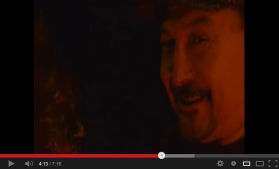Another of Greenland’s pioneering recording artists is Ramsus Lyberth. He was born in Maniitsoq in western Greenland in 1951 and trained as both an aircraft maintenance technician and actor. Since the release of his first album “Erninga” (‘For my son’) in 1975 he has however principally been known as a musician. Lyberth is furthermore known in Greenland as a spiritual person and this spirituality often finds its way into his lyrics, in interaction with nature and human emotions. Lyberth is one of the relatively few artists from Greenland ever to gain recognition beyond the borders of Greenland, in his case particularly in Denmark.
The musical style performed by Lyberth is quite different from that of Sume, even though performing a sense of place and injecting his music with a sense of Greenlandic identity is pivotal in his musical production as well. Lyberth does not play rock music but a kind of folk style in which gesticulating and recitative vocal passages are often at the center of the performance. The lyrics speak of the romantic ideal of Greenlandic nature, and in the onset of his career Lyberth was criticized for not writing political texts in the same manner as other bands and artists (Johansen 1991: 55). Lyberth did however engage with some of the identity politics that caught on during the project of Greenlandification. An example of this is when he played the lead role in the movie “Qaamarngup uummataa” (‘Heart of light’) (1998) in which he was Rasmus, a Greenlander who feels conflicted between a Danish and a Greenlandic identity. Lyberth has actually also brought this theme into his music, as in the song “Ajajajaa” from the album “hey hey” (2008) (cf. fig. 8).
The musical style of Lyberth is quite distinct from other styles in the music scene in Greenland, which is generally very dominated by catchy pop and rock music. Lyberth’s music is evocative, and mainly suitable for attentive listening, but his identity as a performer from Greenland is central to his international success. He is perhaps one of the few artists in Greenland that engage with producing a kind of world music, in the sense that he performs as an ‘other’ to the west, but still manages to package this otherness in recognizable musical forms (cf. Stokes 2004: 53; Brusila 2003: 18). In Lyberth’s case, he seems to draw inspiration from well-known, somewhat exotic styles like Latin, and makes use of more ambient soundscapes than what is the norm in Greenlandic popular music. He thus combines different styles associated with different places to establish sounds of ‘otherness’ that, along with his Greenlandic lyrics and narrative style, establish a sense of Greenlandic place to his audience, but this version of place and his way of performing it, are his own interpretation and do not represent general trends in the Greenlandic music scene.
Fig. 8: The official music video for the track ”Ajajajaa” by Rasmus Lyberth (2008):

